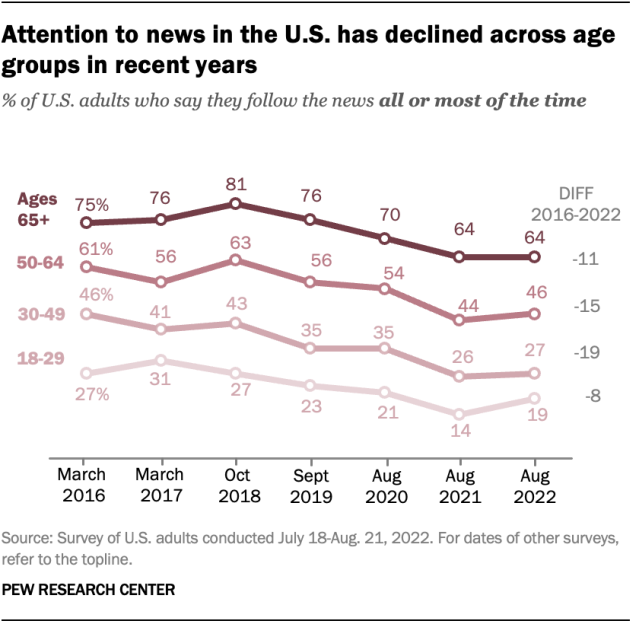☀️ Good morning! The Briefing is your guide to the world of news and information. Sign up here!
In today’s email:
- Top story: Dozens of states sue Meta, claiming its platforms are addictive and harmful to children’s mental health
- New from Pew Research Center: Share of Americans who follow the news closely has fallen since 2016
- In other news: Community radio stations in South Africa embrace social media to engage with young people
- Looking ahead: DOJ’s antitrust lawsuit against Google
- Chart of the week: Older adults continue to say they follow the news at a greater rate than younger adults
🔥 Top story
This week, a majority of U.S. states sued Meta, the parent company of Facebook and Instagram, arguing that the company intentionally sought to make children addicted to its platforms. The lawsuit, filed by 33 states, also claims that Meta has “concealed the ways in which these platforms exploit and manipulate its most vulnerable consumers: teenagers and children.”
While the share of U.S. teens who use Facebook has fallen dramatically in recent years, according to a 2022 survey, a majority of Americans ages 13 to 17 use Instagram (62%). This includes 10% of U.S. teens who say they are on Instagram “almost constantly.”
🚨 New from Pew Research Center
A new Pew Research Center analysis of surveys from 2016 to 2022 finds that a declining share of Americans say they have been following the news closely.
Key findings include:
- The share of U.S. adults who say they follow the news all or most of the time fell from 51% in 2016 to 38% in 2022, the last time we asked this question.
- A rising share of Americans say they follow the news only “now and then.” While 12% of adults said this in 2016, that figure increased to 19% by 2022. And while 5% said in 2016 that they hardly ever follow the news, 9% said the same last year.
- In 2016, 57% of Republicans and independents who lean Republican said they followed the news all or most of the time. In the 2022 survey, 37% said the same, a decrease of 20 percentage points. By comparison, the share of Democrats and Democratic leaners who say this dropped by only 7 points, from 49% to 42%.
Read the rest of the analysis here.
📌 In other news
- South African community radio stations embrace social media to engage with young people
- Pro-Palestinian creators use “algospeak” to evade social media algorithms
- A Q&A with the first mixtaper at The New York Times
- Lessons from El Tímpano’s efforts to train Latino immigrants to identify disinformation
- As tech platforms pull away from the news industry, news organizations scramble to adapt
- Palestinian analysts describe canceled appearances and segments pulled from CBS and CNN shows
📅 Looking ahead
This week, we look ahead to the landmark antitrust case that the Department of Justice has brought against Google claiming that it has created a monopoly over online search. One chief claim that the DOJ has made is that users do not seem to actively choose a search engine and that Google is often the default.
In a 2022 Center survey, we found that 60% of U.S. adults get news at least sometimes from search engines such as Google and that about one-in-ten Americans prefer to get their news through search.
📊 Chart of the week
This week we released a new analysis on how closely Americans say they follow the news. While Americans in all age groups have become less likely to say they follow the news all or most of the time since 2016, older adults remain the most inclined to follow the news closely.

👋 That’s all for this week.
The Briefing is compiled by Pew Research Center staff, including Naomi Forman-Katz, Jacob Liedke, Sarah Naseer, Christopher St. Aubin, Luxuan Wang and Emily Tomasik. It is edited by Katerina Eva Matsa, Michael Lipka and Mark Jurkowitz, and copy edited by Rebecca Leppert.
Do you like this newsletter? Email us at journalism@pewresearch.org or fill out this two-question survey to tell us what you think.